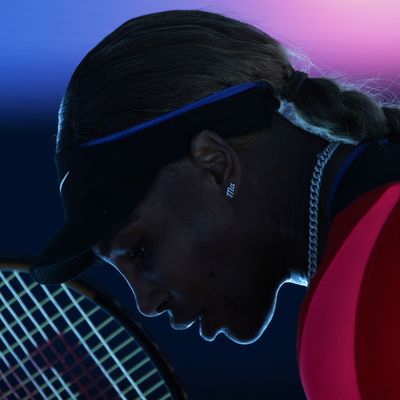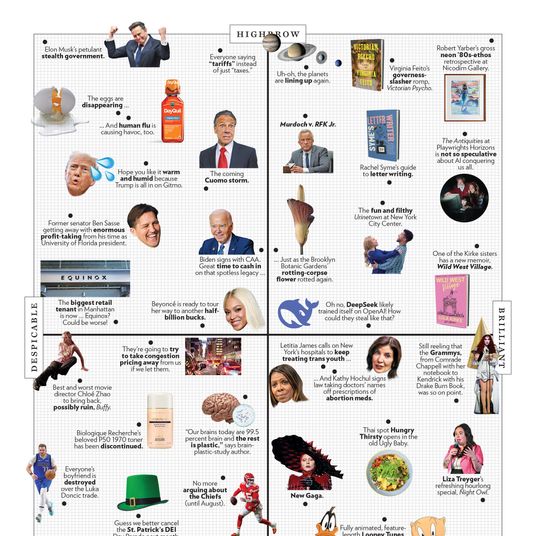
For the first ten or so minutes of her semifinal match against Naomi Osaka at the Australian Open on Thursday afternoon, it seemed as if Serena Williams — fitter than she has looked in years and hardened, perhaps, by a string of gutting late-tournament losses since giving birth to her daughter in 2017 — might finally have been ready to capture her 24th major title. With it, she would have earned the lone distinction still to elude her in an unparalleled, now quarter-century-long career. Williams certainly has nothing left to prove on the tennis court. But the prospect of No. 24, which would tie her with Margaret Court for the most Grand Slam titles of all time, has presided fatefully over the twilight of her career, engineered in part by sports media’s obsession with completism (with 24, could anyone question her status as the GOAT?) and maybe even more so by Williams’s own uncanny ability, at the age of 39, to muster still more motivation when most athletes would have long ago called it quits.
In Melbourne, against the fearsome, precociously cool Osaka, Williams started strong, breaking the 23-year-old’s serve and taking a quick 2-0 lead. Riding a 19-match winning streak, Osaka appeared nervous and unsettled — as Williams herself has seemed in her four Grand Slam final appearances since becoming a mother, all straight-set losses. But then, with a sad inevitability, Osaka, a student of the woman standing across the net, dialed up her own killer instinct, reeling off five straight games and, eventually, the match, 6-3, 6-4. It was the kind of feat Williams used to pull off regularly, one we’d all like to see happen at least once more for a fitting capstone to her magnificent career.
But it’s becoming clearer, both to us and to her, that it may not happen. On the sport’s biggest stages, Williams’s pursuit of 24 has been thwarted by two of the game’s rising stars, Osaka and Bianca Andreescu, whose brutalizing and aggressive styles of play were molded in the image of Williams and her sister Venus, who continues to play into her 40s. It’s worth acknowledging once again — despite the remarkable late-career achievements of Roger Federer on the men’s side and the likes of LeBron James and Tom Brady — that this is not normal. Tennis has historically been a young person’s game. Williams’s greatest rivals, from Justine Henin to Kim Clijsters to Lindsay Davenport, are all long gone, governed as most are by the laws of physics. Now those laws finally seem to be applying to the woman who won her most recent Grand Slam title in 2017 while eight weeks pregnant. The question of when and where the road ends is clearly on Williams’s mind; she abruptly concluded a tearful post-match press conference after the question of her retirement was raised.
Perhaps the most singular thrill in sports is the privilege of watching an athlete like Williams, who at her peak was simultaneously in complete control of and unburdened by her body. Now we’re witnessing what happens when, inevitably, a generational talent cannot quite summon her A game, no matter how hard she tries. At her best, Williams was once literally unbeatable, in possession of a then-revolutionary combination of power and court smarts. These days, even her best (which still emerges from time to time, as it did in her recent quarterfinal match against world No. 2 Simona Halep) may not quite cut it, at least not when she’s matched with a player like Osaka, an exceptional ball striker whose best is likely yet to come — a scary proposition.
That was apparent throughout most of Thursday’s match, as Williams’s vintage display of tennis over the past two weeks came to an anticlimactic end — nothing like the infamous, 2018 U.S. Open final when she lost to Osaka and received three code violations. This time, she went out with a whimper, not a bang. Osaka now holds the unofficial title of world’s best player, an honor Williams has maintained, almost without interruption, since the year of Osaka’s birth. Osaka doesn’t seem entirely comfortable with this passing of the torch, saying after the match, “I want her to play forever. Well, that’s the little kid in me.”
That feeling — childlike wonder — is what it has long felt like to watch Serena Williams, even when she was a kid revolutionizing the sport in white beads and a Puma dress. She may still get the all-time record; Wimbledon, played on her preferred grass, beckons this summer. Whether she hits 24 or not, the story of modern tennis will be B.S. and A.S., before and after Serena, her legacy in the game secure even in defeat.





























